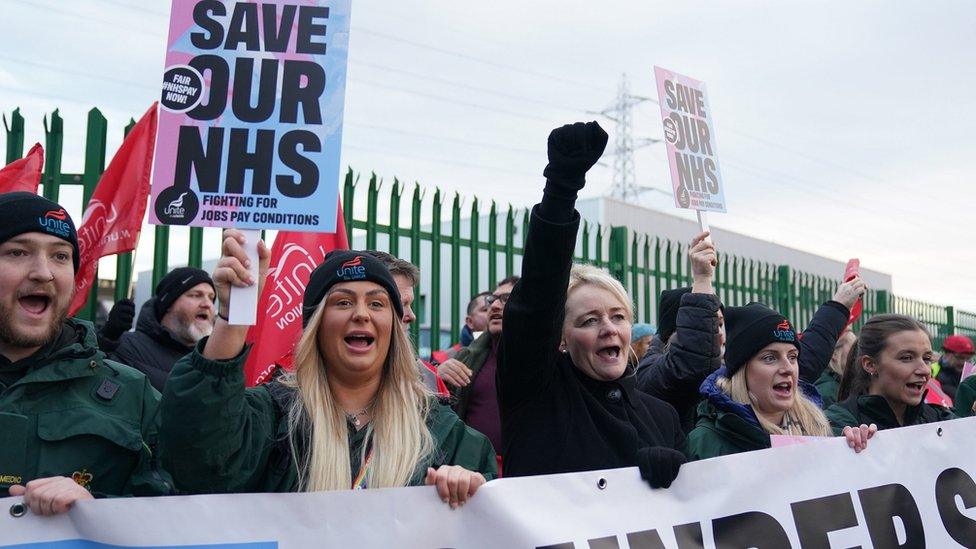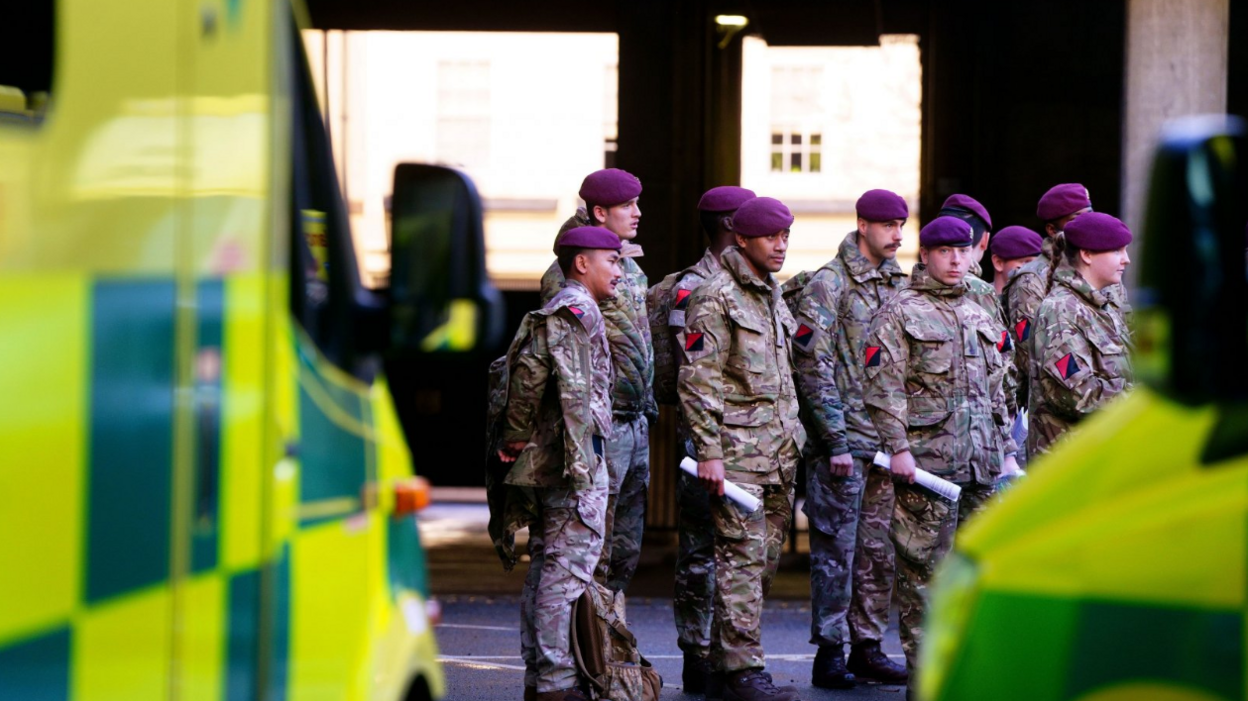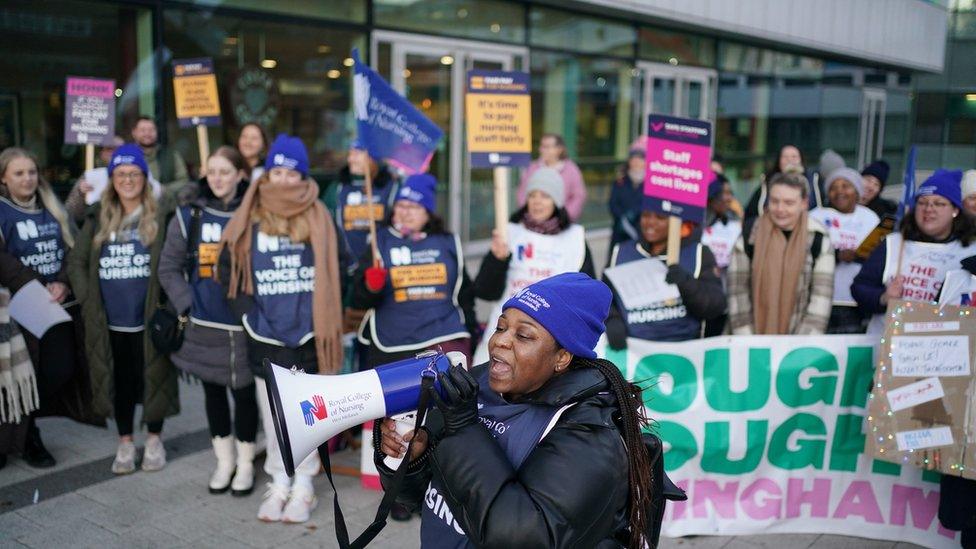Ambulance strike: Blame game escalates between unions and ministers
- Published
- comments
Ambulance strike: Unions refused to work with us on national planning - Steve Barclay
Ministers and unions have clashed over who would be to blame for preventable deaths during ambulance strikes.
Unite boss Sharon Graham accused Health Secretary Steve Barclay of telling "a blatant lie" when he said ambulance unions had "taken a conscious choice to inflict harm on patients".
Mr Barclay blamed unions for striking when the NHS was under significant pressure.
But the unions said he was at fault for refusing to negotiate on pay.
Paramedics, control room staff and support workers, who are members of the Unison, GMB and Unite unions, are striking across much of England and Wales on Wednesday.
Unions representing ambulance workers want pay increases to keep up with the rising cost of living. They have not set a specific figure but argue any offer needs to be high enough to prevent a recruitment crisis.
However, ministers say they will not negotiate on pay as they have met independent pay recommendations.
'Utterly shocked'
NHS bosses are warning patient safety cannot be guaranteed during the strike action, although unions say life-threatening callouts will still be responded to by an ambulance.
They also argue patients are already being put at risk due to waiting times, made worse by staff shortages.
In an article for the Daily Telegraph, external, Mr Barclay accused ambulance unions of choosing to harm patients and making contingency planning more difficult.
He said unions had refused to work with the government at a national level on how they would cover emergency calls during strike action.
Unison said it was "utterly shocked" by the comments, while the GMB union said they were "insulting".

Sharon Graham (centre), the head of the Unite union, joined striking ambulance workers on a picket line in Coventry
Mr Barclay later told BBC Breakfast ambulance unions had chosen to strike at a time "when the system is already facing very significant pressure" from increased flu and Covid admissions.
Asked who would be responsible for any preventable deaths during the industrial action, he said: "It is the trade unions who are taking this action at a point of maximum pressure for the NHS."
But unions rejected Mr Barclay's claims.
Ms Graham said: "The unions have negotiated critical cover, including 999 calls, at a local level with hosts of NHS Trusts.
"Steve Barclay obviously doesn't understand how these issues are dealt with in the NHS.
"That is an embarrassment for him and the government. He has now lost all credibility. Clearly he isn't the man for the job."
Christina McAnea, head of Unison, said the health secretary had "never specifically asked Unison for a national contingency agreement" and had acknowledged local unions had negotiated "detailed, appropriate plans for their areas".
She has previously said any deaths during the strikes would "absolutely" be the fault of the government for refusing to open negotiations.

What do I do if I'm hurt?
Patients who are seriously ill or injured, or whose lives are in danger, are being advised by the NHS to call 999.
For all other healthcare needs, the NHS is advising people to contact NHS 111 online or via the NHS 111 helpline, external, or to contact their local GP or pharmacy.

Prof Sir Stephen Powis, national medical director of NHS England, said people should be "sensible" on a "very difficult day" for the health service.
He urged people not to get "blind drunk" at Christmas parties and end up in A&E unnecessarily.
Burnt out
Ambulance response times for emergency category two 999 calls, such as strokes and heart attacks, are already twice as long as two years ago.
Some unions and ambulance services said there had been less demand than usual on Wednesday, as the public appeared to heed warnings to only call in an emergency.
Unions have agreed striking workers can leave picket lines to respond to the most serious, life-threatening calls if necessary. This contributed to some picket lines being less busy than during Tuesday's nursing strikes.
In Cardiff, all those on the picket line were called away to respond to emergencies.
Outside other ambulance headquarters the scene was noisier, with some members of the public honking their car horns or dropping off food to show their support.
Dave Skinner, an emergency medical technician for the London Ambulance Service who is striking, said staff were burnt out and struggling with shortages.
"Patients are dying waiting for us because there's physically nobody to send," he told the BBC.
He said experienced people were leaving the profession for better pay and conditions, adding: "I don't blame my colleagues for going elsewhere."
One paramedic, who wanted to remain anonymous, said they would not strike, after the "bad memories of how [industrial action in 1989] left me financially".
However, they said they understood why others had chosen to walk out.
"This government is systematically destroying the NHS and harming patients on a daily basis," they told the BBC.
Pay review
There are currently no signs ministers will budge on pay, although some Conservative MPs believe they will have to compromise eventually.
Asked whether the government would stick to its position not to deviate from the offer recommended by the independent pay review body, Mr Barclay said this was "a long-standing position".
However, he said staff should "look forward" to next year's pay review process, which is already under way.
The UK is facing a wave of strikes this winter, with nurses, rail workers and Royal Mail staff among those walking out.
Some MPs are concerned offering concessions on pay to one group of workers could lead to other demanding the same, which they argue would make inflation worse.

What's happening in my area?
Not all unions are striking for the same hours on Wednesday, and it is difficult to say how many workers at each individual service will strike.
You can use our interactive tool to find out which unions are on strike at your local ambulance service:
Your device may not support this visualisation

Related topics
- Published21 December 2022

- Published20 December 2022
